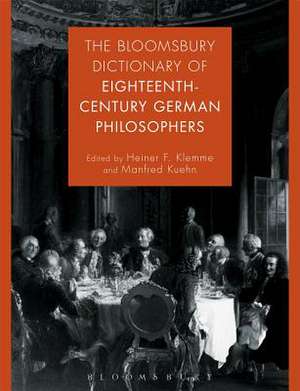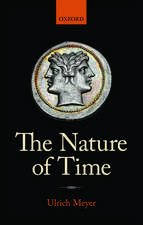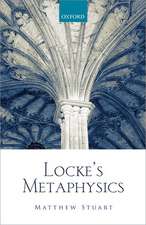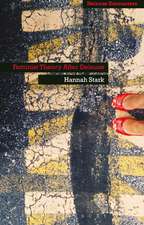The Bloomsbury Dictionary of Eighteenth-Century German Philosophers
Editat de Heiner F. Klemme, Manfred Kuehnen Limba Engleză Paperback – 29 iun 2016
Preț: 513.72 lei
Preț vechi: 872.20 lei
-41% Nou
Puncte Express: 771
Preț estimativ în valută:
98.31€ • 106.75$ • 82.58£
98.31€ • 106.75$ • 82.58£
Carte disponibilă
Livrare economică 01-15 aprilie
Preluare comenzi: 021 569.72.76
Specificații
ISBN-13: 9781474255974
ISBN-10: 1474255973
Pagini: 944
Dimensiuni: 189 x 246 x 51 mm
Greutate: 1.81 kg
Editura: Bloomsbury Publishing
Colecția Bloomsbury Academic
Locul publicării:London, United Kingdom
ISBN-10: 1474255973
Pagini: 944
Dimensiuni: 189 x 246 x 51 mm
Greutate: 1.81 kg
Editura: Bloomsbury Publishing
Colecția Bloomsbury Academic
Locul publicării:London, United Kingdom
Caracteristici
Features more than 650 entries on eighteenth-century German philosophers, theologians, jurists, educators, literary critics, historians and doctors
Notă biografică
Heiner F. Klemme is Professor of Philosophy at Martin Luther University Halle-Wittenberg, Germany. He works primarily in the history of modern philosophy, specializing in Kant's philosophy and in Scottish Enlightenment, and in practical philosophy. Some of his previous works include: Kants Philosophie des Subjekts (Meiner, 1996), Immanuel Kant (Campus, 2004), and David Hume (Junius, 2007). He works primarily in the history of modern philosophy, specializing in Kant's philosophy and in Scottish Enlightenment, and in practical philosophy. Manfred Kuehn is Professor of Philosophy at Boston University, USA. He has received Fellowships from the Canada Council, the National Endowment for the Humanities, and the Institute of Advanced Studies of the University of Edinburgh. He has taught in Canada, Germany and the U.S.A., and was Visiting Professor at the University of Hamburg, Germany.
Cuprins
Introduction and Acknowledgements How to use the Dictionary General bibliographyList of contributorsBiographical entries A-ZIndex
Recenzii
The Bloomsbury Dictionary of Eighteenth-Century German Philosophers is an outstanding reference work that provides reliable and detailed information about German thinkers both great and small throughout the 18th Century. The first rate team of scholars who have contributed their expertise makes the Dictionary useful both for its lengthy articles on major philosophers and for the information it provides on figures of whom one has no prior knowledge.
The Bloomsbury Dictionary of Eighteenth-Century German Philosophers is an invaluable resource for scholars working on Leibniz, Kant, and everything in between. The many detailed entries, written by leading scholars in the field, provide a fascinating glimpse into the incredibly rich and vibrant intellectual culture of Enlightenment Germany. Now that it is newly available in this (expanded) paperback edition, the Dictionary should, and undoubtedly will, find a place on the desk of every serious scholar and student of this period.
The Bloomsbury Dictionary of Eighteenth-Century German Philosophers is an invaluable resource for scholars working on Leibniz, Kant, and everything in between. The many detailed entries, written by leading scholars in the field, provide a fascinating glimpse into the incredibly rich and vibrant intellectual culture of Enlightenment Germany. Now that it is newly available in this (expanded) paperback edition, the Dictionary should, and undoubtedly will, find a place on the desk of every serious scholar and student of this period.
















